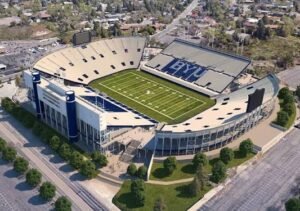CONFIRMED: BYU Football Approves $4.2 Billion Stadium Renovation Project for 2025 and…..see more….
 In a groundbreaking announcement that has sent shockwaves through the college football world, Brigham Young University (BYU) has officially approved a $4.2 billion stadium renovation project set to begin in early 2025. The project, aimed at transforming LaVell Edwards Stadium into one of the most advanced athletic venues in the world, marks a bold new era for the Cougars and the future of college sports infrastructure.
In a groundbreaking announcement that has sent shockwaves through the college football world, Brigham Young University (BYU) has officially approved a $4.2 billion stadium renovation project set to begin in early 2025. The project, aimed at transforming LaVell Edwards Stadium into one of the most advanced athletic venues in the world, marks a bold new era for the Cougars and the future of college sports infrastructure.
“An Unprecedented Investment in the Future of BYU Football”
University President Shane Reese, alongside Athletic Director Tom Holmoe, unveiled the plans at a press conference on campus Friday morning.
> “This renovation reflects our unwavering commitment to student-athletes, fans, and the community,” said President Reese. “It’s not just about a stadium. It’s about creating a world-class experience that reflects BYU’s values, vision, and competitive spirit.”
The renovation will be the largest single capital investment in university history—and one of the largest ever in NCAA athletics.
—
Key Features of the $4.2 Billion Renovation Plan
The design, created by global architecture firm Populous, includes cutting-edge features that will redefine the game-day experience:
🏟️ Expanded Seating Capacity
Increase from 63,470 to 85,000+ seats
Redesigned bowl structure for improved sightlines
Over 10,000 new premium and club-level seats
📺 Immersive Technology
360-degree LED ribbon boards and dual 8K jumbotrons
AI-powered replays and augmented reality fan experiences
Stadium-wide 5G+ connectivity and wireless charging stations
🏈 Athlete Facilities
State-of-the-art training complex beneath the stadium
Cryotherapy chambers, rehab pools, and motion tracking systems
Personalized locker rooms with interactive touchscreens
💼 Luxury & Fan Amenities
120 luxury suites with skyline views
Open-air rooftop lounges and high-end dining options
Expanded concourses with climate-controlled zones
♻️ Sustainability Initiatives
Net-zero energy certification
Solar panel roofs, water recycling, and green transportation hubs
LEED Platinum environmental design standard
—
Timeline & Construction Phases
The project will roll out in three phases, allowing BYU to continue hosting home games throughout construction:
Phase 1 (2025–2026): Underground training facilities, tech infrastructure, and west stand upgrades
Phase 2 (2026–2027): East and north stand expansion, concourse renovations
Phase 3 (2027–2028): Luxury suites, rooftop lounges, sustainability systems
Completion is expected by Fall 2028, just in time for BYU’s 10th season in the Big 12 Conference.
—
Funding the Future
The university confirmed that the $4.2 billion price tag will be funded through a mix of private donations, naming rights partnerships, athletic revenue reserves, and bond financing.
Billionaire BYU alumnus and tech entrepreneur David S. Rasmussen has pledged a historic $1 billion lead donation, the largest single gift in school history.
The stadium will retain the LaVell Edwards Stadium name in honor of the legendary coach, though sections may bear corporate naming rights.
—
Big 12, Big Dreams
Joining the Big 12 in 2023 significantly raised BYU’s national profile, and this stadium project positions the program as a major player in the college football arms race.
> “This move elevates our program into a new stratosphere,” said head coach Kalani Sitake. “Our players will benefit, our fans will benefit, and our recruits will take notice.”
—
Fan Reaction and National Buzz
News of the renovation has sparked massive attention across social media, with hashtags like #BYU42Billion and #FutureOfLaVell trending nationwide.
ESPN’s Kirk Herbstreit called the announcement “a massive statement from BYU,” while college football forums lit up with praise, skepticism, and comparisons to NFL venues like SoFi Stadium and Allegiant Stadium.
—
Conclusion: A New Era Begins in Provo
The $4.2 billion renovation signals not just a commitment to facilities but a vision for the future of BYU athletics. It’s a project that blends faith, innovation, and football excellence—a hallmark of BYU’s place in the modern college sports landscape.
As construction crews prepare to break ground in 2025, one thing is clear: the Cougars are building more than just a stadium—they’re building a legacy.









Post Comment